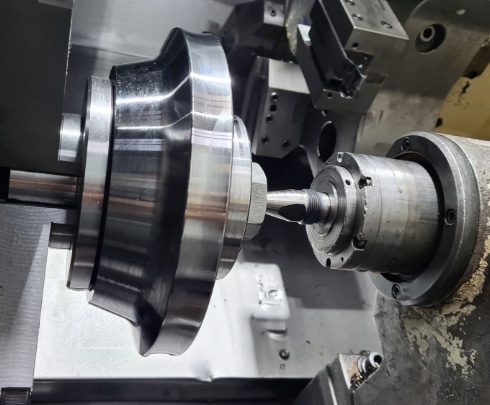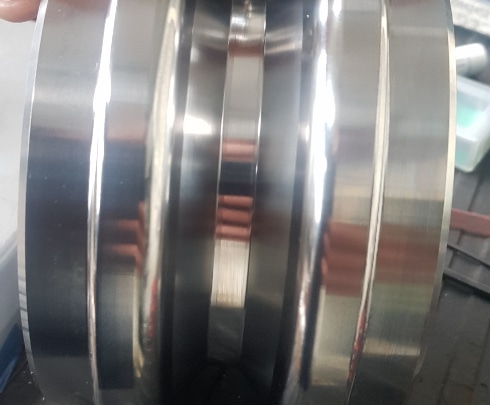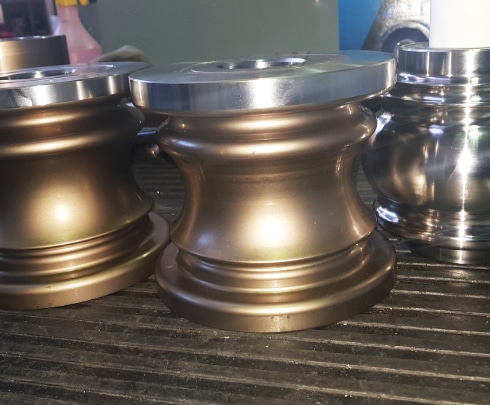
Unlike sections, with tube the whole strip width is worked into a series of curved shapes until the welded shape is achieved, rather than producing discrete localised bends with straight elements between them. The welded shape is almost always is a circular cross section at what is known as the welded diameter which is slightly larger than the required finished tube diameter, though in certain instances other shapes can be used where these prove more appropriate.
The welded shape is almost always a circular cross section at what is known as the welded diameter which is slightly larger than the required finished tube diameter, though in certain instances other shapes can be used where these prove more appropriate.
Tube mills have a series of driven forming passes prior to the weld. These are described as breakdown passes where the inner, (top), and outer, (bottom), surfaces of the strip are both in contact with the roll tooling, or fin passes, where only the outer, (bottom), surface and the strip edges are in contact with the roll tooling.
The driven passes are interspersed with side idler rolls, which play an important role in forming the strip, and help to minimise scuffing and marking on the strip which results in deposits of strip material adhering to the roll surfaces in the next driven roll pass, (known as pick-up). After the weld the tube goes through a series of sizing passes, (again with both driven and idler rolls), which control the roundness and finished diameter of the tube.
Tube mills have a huge variety of configurations with different numbers of breakdown, finpass and sizing passes, different weld roll arrangements and different weld technologies. Bellcliffe can call upon a wealth of experience producing rolls for many different tube and pipe mills from the biggest tube mill manufacturers in the industry.
After the weld pass tubes can either be sized to a finished round tube diameter or alternatively can be reshaped from round to a finished shaped tube. Commonly squares, rectangles and flat-sided ovals are produced, although shaped tubes are not limited to these, and bespoke tube shapes can be made to customer specifications.
Shapes produced from a round welded tube on a tube mill are necessarily simpler than those which can be made on a welded section roll forming mill because there are few passes of rolls to achieve the finished size and shape. Bellcliffe have experience producing roll tooling for a vast array of shaped tubes on many different tube mills.
Tubes are an example of a closed profile, as the strip edges are joined together fully enclosing what lies within, separating inside from outside. Most sections, on the other hand, are open shapes - they do not join together completely, however some sections are closed profiles with the edges joined together, although at the weld pass the shape of the section is not round as it is generally on a tube mill, but a developed shape comprising a series of bends and straight elements.
There are numerous applications for rolled tubes and sections, such as construction materials, mechanical components, and parts for consumer goods. Tubes are often used for pipes, whereas the uses of sections are innumerable including structural shapes, such as I-beams and C sections.
Whatever your tube roll forming requirements and your tooling needs for forming, straightening, detwisting and cutting tubes, Bellcliffe can produce high quality tooling to assist in these operations. We work alongside you to ensure your tooling is fit for application.


Capabilities & Technical Specifications
At Bellcliffe Engineering, we can draw upon over 100 years of combined experience in order to assist our customers with any problems they may encounter whilst tube making. We work with a range of materials to best meet your specifications and dimensional tolerance requirements. Our manufacturing services are the number one choices for many companies across the globe.
Contact us at Bellcliffe Engineering and request a free site survey, allowing us to examine how we may best serve you from the start of our working relationship, gathering accurate information and a greater understanding of your needs by assessing your machinery directly and observing any problems you wish to address on the machine.
Bellcliffe Engineering can make machinery and components from your existing drawings to your exact specifications, or alternatively we can supply replacement parts reverse engineered from samples provided and measurements taken onsite or even upgraded and enhanced redesigned parts with new features for easier installation and setup, improved usability and greater capabilities - get in touch with us today to enquire how we can serve you.
Applications
We can provide tube and section roll forming tooling and components for all sectors, including, but not limited to:
Sections can be designed and manufactured for industries such as:
We can work with a variety of materials to best meet your specifications and requirements; tooling can be designed for the rolling of different engineering materials including various steel grades, stainless steels, and exotic alloys. The Bellcliffe Engineering team can draw on many years of prior experience and have been involved in making roll sets for tube sizes ranging from 6.35mm- 609.6mm (¼” - 24”) diameter.
FAQs
The materials used for roll tooling for both roll forming mills and tube mills, will depend on the mechanical properties of the strip material to be formed and the circumstances that the roll is used in within the machine - it must have the right properties to be able to endure its application. For example, a material with heat resistance properties would be needed for the high temperatures found in the welding section. Rolls used in cold working of the strip material are made from a cold work tool steel such as D2, (Werkstoff No. 1.2379), or O1, (Werkstoff No. 1.2510), though for section rolls case hardening steels can sometimes be a more economical choice. Rolls used in hot working of the strip material, such as the weld rolls and other similar applications, can be made from a cold work tool steel such as H13, (Werkstoff No. 1.2344). Bellcliffe work closely with their heat treatment suppliers to ensure the hardness toughness and wear resistance of their rolls is maximised for their given application.
In certain circumstances engineering grade polymers can be used for rolls where weight reduction is critical and the wear conditions the roll will encounter do not preclude it. Bellcliffe can also source special coatings on rolls to improve their durability and extend their working life, and rolls can be urethane coated too, if the application so requires.
Bellcliffe can also reprofile your existing tube mill rolls when they are too worn to continue producing good tube in their current condition, providing that you can supply fully dimensioned drawings.